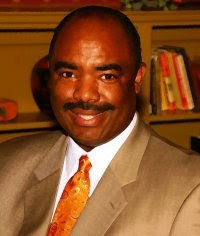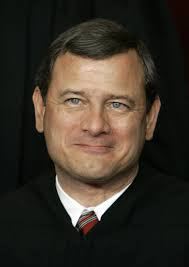By Kathy Wray Coleman, editor-in-chief, Cleveland Urban News.Com and The Kathy Wray Coleman Online News Blog.Com, Ohio's No 1 and No 2 online Black newspapers. Reach Cleveland Urban News.Com by email at editor@clevelandurbannews.com and by phone at 216-659-0473
Pictured are Congresswoman Marcia L. Fudge (D-11) of Ohio, President Barack Obama (Black man in blue tie), Ohio state Rep. John Barnes Jr (D-12) (in orange tie), Cuyahoga County Executive Ed FitzGerald (in red tie), Ohio Secretary of State John Husted (White man in blue tie), U.S. Supreme Court Chief Justice John Roberts Jr. (White man in judicial robe), and U.S. Supreme Court Justice Clarence Thomas (grey-haired Black man in judicial robe)
WASHINGTON, D.C.-The U.S. Supreme Court on Tuesday struck down a key provision of the Voting Rights Act of 1965, a 5-4 ruling that President Obama and congressional Black Democrats, including U.S. Rep. Marcia Fudge (D-11) of Ohio, who also chairs the Congressional Black Caucus of Black members of Congress, are calling an unprecedented step backwards to decades of Civil Rights gains.
The nation's high court, in Shelby County v. Holder, invalidated the portion of the Voting Rights Act enacted with other provisions in the 1960s that required 15 states that historically discriminated against Blacks to get federal approval to change state voting laws. And though Ohio is not among those states, it is impacted relative to other provisions that pertain to all states across America.
"Today's decision invalidating one of its core provisions upsets decades of well-established practices that help make sure voting is fair, especially in places where voting discrimination has been historically prevalent," said Obama in a press release to Cleveland Urban News.Com, Ohio's most read online Black newspaper.
Writing for the majority, Chief Justice John G. Roberts Jr (pictured), the swing vote that won for Obama for the Healthcare Affordability Act just months before last year's presidential election, also a spit 5-4 decision, said that the formula for determining compliance with the Voting Rights Act by the affected states was outdated and antiquated. The justices said that the voting rights provision at issue, under section 4 of the Voting Rights Act, must be updated to deal with the "changing times."
How Ohio fits into any revised formula is not quite clear.
Justice Clarence Thomas, the only Black on the U.S. Supreme Court, sided with the majority, and drew disdain from Minnesota state Rep. Ryan Winkler, who called Thomas an "Uncle Tom," a historical term used in the Black community for Blacks that are subservient to the White establishment and sellout to White racism.
Justice Ruth Bader Ginsburg wrote the dissenting opinion where the justice brilliantly chastised her colleagues that supported the elimination of a watchdog provision that she and the three other liberal justices of the high court say is necessary in voting and in a plethora of other cases, including cases challenging discrimination in public education.
Flanked by members of the Congressional Black Caucus including seasoned congressional legislators Reps. Clyde Rayburn of South Carolina, John Conyers of Michigan and John Lewis of Georgia, Fudge, a Warrensville Hts. Democrat, said at a press conference yesterday that the controversial decision represents "one of the worst days for Civil Rights and civil discourse in this country's history."
Fudge called for a federal law that addresses Ohio in particular saying that efforts by Republican Ohio Secretary of State Jon Husted to stop weekend voting coupled with other shenanigans during last year's presidential election to target those that use it most, mainly minorities and poor people, lends credence to the harm the court's decision brings to the Black community, and to poor people.
Husted's efforts though were circumvented after the Obama for America Campaign sued Husted and won in federal court, and on appeal to the Sixth Circuit, but on the provision that permitting weekend voting for military personnel and not for other Ohioans was inequitable and thus unconstitutional.
The president went on to beat Republican presidential nominee Mitt Romney for reelection to a second four year term after winning Ohio, a pivotal state for presidential elections.
But the stink behind Husted's scheme to silence the Black and Democratic vote in hopes of pushing Romney to victory upset Ohio Democrats, and outraged Black elected officials, including Fudge and Black members of the Ohio General Assembly.
"The U.S. Supreme Court's decision is extremely disappointing and an effort to keep all voters from engaging in the political process," said state Rep. John Barnes Jr. (D-12), a Cleveland Democrat and an Obama delegate at last year's Democratic National Convention.
Some Cuyahoga County elected officials are upset too.
County Executive Ed FitzGerald, a Democratic candidate for the 2014 race for Ohio Governor, voiced dismay at the high court's decision.
"I'm incredibly disappointed in today's Supreme Court ruling, which is a step backwards for voting rights and weakens the progress we've made toward equal opportunity for all," said FitzGerald. "The court's decision implies that an individual's race and zip code no longer have an effect on equal access to the ballot."
Republican Ohio Gov John Kasich,who has announced that he is seeking reelection next year, has not publicly commented on the celebrated court ruling.















